Welcome to the Atvos Annual Report 2020/2021 crop year. Discover our main achievements in this period.
Destaques da safra
2020/2021
Read +Our operations
Read +
Innovation in the field
Read +
Innovation in industry
Read +
Message from our leadership

As a renewable energy company, what we produce today is helping to build a better future for our planet and to make Brazil’s energy mix one of the cleanest in the world. It was with this future vision in mind that I stepped up as CEO in early 2021.
The 2020/2021 crop year was undoubtedly marked by adversities stemming from the COVID-19 pandemic. We highlight that our more than 9,000 employees and our partners and suppliers were remarkable in their ability to continue to deliver operational excellence while staying safe.
We advanced in our participation in the RenovaBio program. With more than 2.4 million decarbonization credits (CBIOs), Atvos ended the reporting period as one of the leading issuers on the market.
During the crop year we reformulated the composition of the Board of Directors and its four supporting Management Committees, each with a majority of independent members. We revised our Risk Management Policy, which supplements our Risk Matrix in addressing environmental, social and governance (ESG) issues.
I invite you to learn about our significant accomplishments in the 2020/2021 crop year.
Gustavo Alvares
CEO
The Crop Year at a Glance
26.7 million metric tons of crushed sugar cane
2 billion liters of ethanol produced
2,800 GWh of cogenerated electricity
426,000 metric tons of VHP sugar produced
2.4 million CBIOs issued
485,000 hectares cultivated
10.2 million metric tons of sugar cane delivered by 45 contract growers
9,440 employees
In crop year 2020/2021 consumption of our product avoided 5.4 million tCO2e in emissions
ATVOS
We are the second largest ethanol producer in Brazil
Atvos Bioenergia S.A. is a bioenergy company that produces and markets anhydrous and hydrous ethanol, VHP (Very High Polarization) sugar and renewable electricity generated from biomass.
Our products are a key part of a greener energy mix and reducing greenhouse gas (GHG) emissions.
Our sugarcane fields cover an area of 485,000 hectares. At our eight mills, in three production clusters, on-site cogeneration plants also convert biomass into clean electricity.

Production capacity
Crush per crop year: 37 million metric tons of sugarcane
3 billion liters of ethanol enough to fuel 60 million compact cars with renewable fuel**
700,000 metric tons of VHP sugar enough to sweeten 20 million birthday parties***
3,100 GWh of co-generated electricity – enough to supply power to 15 million people
Environmental performance
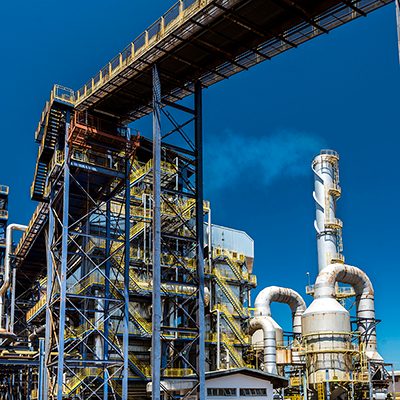
Carbon management
In 2020 all of our operational mills were certified within RenovaBio, a federal government program that aims to expand production of biofuels in Brazil as a strategy to mitigate greenhouse gas (GHG) emissions and increase energy security. The program comprises three pillars—decarbonization targets; biofuel production certification; and decarbonization credits (CBIOs).
2.4 million CBIOs issued
1 CBIO = 1 less metric ton of CO2 released into the atmosphere
= 2.4 million metric tons less of CO2 in the atmosphere
Timeline: GHG emissions management
2012First Bonsucro certification
2013First GHG Emissions Inventory
2015Inventory published within the GHG Protocol Program (silver status)
2016Inventory verified within the GHG Protocol Program (gold status) | FGVCes Emissions Trading System
2017Internal Carbon Pricing Assessment and Ethanol Lifecycle Review (FGVCes)
2018Land Use Change Guidance | UCP issues I-RECs (Renewable Energy Certificates)
2019Team training on RenovaBio
2020100% of operations certified within RenovaBio
2021 Automated carbon index tracking using Renovacalc
AGRICULTURAL PERFORMANCE
Our harvesting operations are 100% mechanized, and burnt-cane harvesting is prohibited in order to prevent fires and help to preserve native vegetation and wildlife.
PEST CONTROL:
- Improved employee safety by avoiding the need to enter the cane field
- Three times greater monitoring capacity compared to previous (visual) methods
- Information accuracy improved from 39% to 67%, supporting action to anticipate issues
- Increased efficiency by prioritizing more susceptible areas for pest control (target areas reduced from 75% to 49%)
- Precision monitoring supports planned biological pest control, reducing dependence on pesticides
- Data collected on temperature, moisture and the date, time and place of release for more efficient biological control
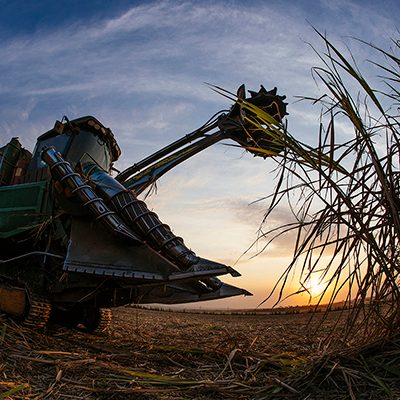

Green manure and fertilization with byproducts:
- 75% of our sugarcane fields are in cerrado areas previously occupied by degraded pastureland that requires soil improvement to replenish depleted nutrients.
- 53% increase in area with rattlepods planted as green manure (4,845 hectares)
- Crop rotation with soybeans used in 28,000 hectares of sugarcane fields, accounting for 50% of Atvos-owned properties. This improves sugarcane yields, replenishes nutrients in the soil, and helps to control weeds, diseases and pests
- 8% expansion in area fertigated with vinasse, reaching 32% (83,000 hectares) of our 260,000 hectares of sugarcane fields. Vinasse fertigation is carried out in strict compliance with Vinasse Application Plans approved by state environmental authorities
- Soot and filter-cake are used for soil nutrition, with the latter being applied in a 16% larger area (18,073 hectares) in the current crop year
- Composting centers produce organomineral fertilizer—a mixture of filter cake, ash and added nutrients that is applied along with vinasse, fully replacing chemical fertilizers
- Investments in pump automation have reduced application overlaps and gaps and incorporation of sugarcane trash, for safer application of vinasse

Industry performance
96.3% mill availability in 2020 – a record for ATVOS
94.3% mill yield (RTC) in crop year 2020/2021: a new record for Atvos *Total Corrected Yeld (RTC) is a metric used in the sugar and ethanol industry in Brazil as a measure of mill efficiency.
Mill innovation
In crop year 2020/2021 we achieved further progress on our mill digitization master plan, implementing Industry 4.0 technologies to deliver higher productivity.
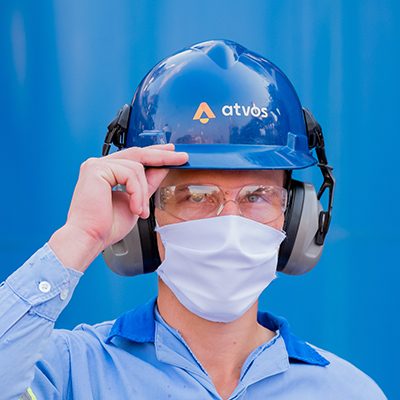
PEOPLE
9,440 employees
Diversity and inclusion are core value for us.
In December 2020 we approved a Diversity & Inclusion Policy to deliver on our commitment to respecting and valuing differences
Women represent 15% of our workforce – a rate higher than the average of 9,2% in our industry
*Based on data from the Brazilian Agricultural Federation (CAN)
Our goal is to have a 26% female workforce by crop year 2023/2024
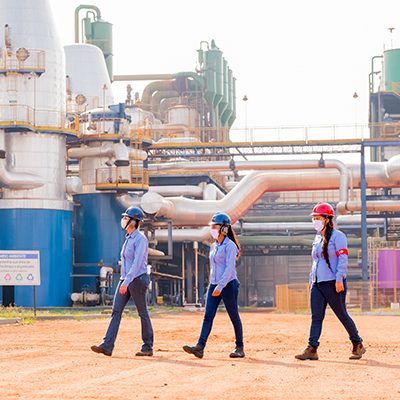
Value chain
Our suppliers are part of “Stronger Partners” Program and undergo to:
- desktop due diligence.
- adherence to Sustainable Sugarcane Supply Chain Commitment, based on ten principles of the Global Compact. This strengthens supplier engagement around sustainable development issues such as respecting human rights, combating child and forced labor, protecting habitats, anticorruption and legal compliance.
- Periodically sustainability assessment rounds by a Atvos multidisciplinary team.
In 2020/2021 we had a total of 2,266 suppliers. 100% of them undergo due diligence.
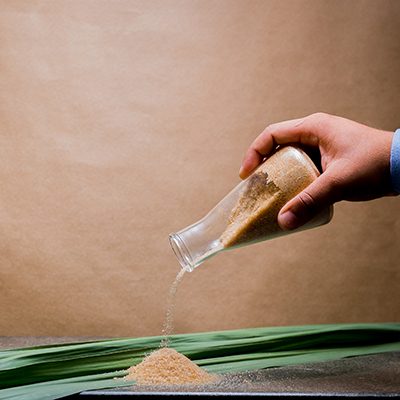
10.2 million metric tons of sugarcane delivered by contract growers
45 contract sugarcane growers
In crop year 2020/2021 our 1,155 agricultural partners received
R$ 1,365 million in payments
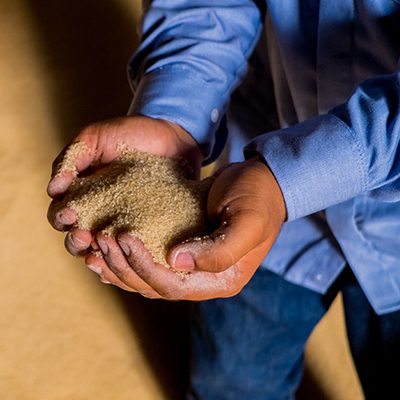
Our COVID-19 response
As in the previous crop year, we had measures in place to prevent and contain the spread of COVID-19.
- All office employees in São Paulo and Campinas and administrative employees at all mills were assigned to work from home. Some employees in the at-risk group (those older than 60, pregnant women, people with chronic illnesses and people with a BMI higher than 40) were also assigned to work from home. Employees whose tasks cannot be done remotely were put on paid leave.
- Other employees required to be on-site at our operations were divided into shifts to reduce occupancy at our facilities and on shuttle buses.
- We are disinfecting shuttle buses thoroughly after each trip. Windows are kept open and seats marked to ensure minimum distancing.
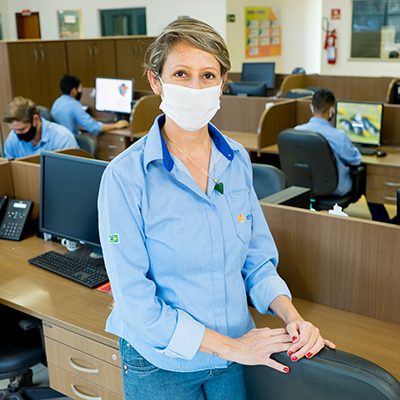
- We issued protective kits (face masks and gloves) to bus drivers and provided alcohol-based hand sanitizer containers at bus entrances. We also take people’s temperature when boarding shuttle buses and at all plant gates—this also applies to outsourced workers.
- We provide hand sanitizers in all plant areas and in the field, and have issued masks to all employees working on-site.
- All farm machinery and vehicles have a cleaning kit, and gatekeepers and security staff have also been issued face masks and gloves.
DONATION OF 70% ALCOHOL
Following the outbreak of the COVID-19 pandemic, we mobilized and reconfigured our operations in record time to produce 70% alcohol. Atvos donated 102,200 liters of 70% alcohol and hydrous ethanol in the previous crop year, and 72,429 liters in crop year 2020/2021, benefiting 22 municipalities.

 Anual Report 2020/2021
Anual Report 2020/2021